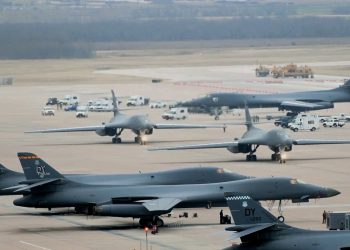,
WASHINGTON: Boeing Co. said on Monday the Pentagon needed to allocate funds to buy 12 more C-17 transport planes beginning in fiscal 2008 to avoid a future gap in the plane's production line.
Boeing C-17 program manager Dave Bowman said a recent move by Congress to add 10 C-17s to the fiscal 2007 defense budget, which runs until Sept. 30, would help keep the C-17 production line in Long Beach, California, running until the end of 2009.
But that came only after Boeing had already spent tens of millions of dollars of its own money to keep the line going and keep suppliers on board, Bowman told a teleconference. Production briefly shut down in August and work was halted on four planes before Congress added the new planes, he said.
To avoid a similar impasse in the future, the Pentagon needed to earmark funds for 12 more C-17s in its fiscal 2008 budget plan, Bowman said, noting that long lead procurement for materials for the next batch of C-17s needed to start in 2007.
“It's not so much the production in 2009 and 2010, but how long it takes to build a block of C-17s,” he said.
Boeing had lobbied Congress heavily to extend production of the C-17, which brings in about $3 billion in annual revenue.
Bowman said he expected a new Pentagon study on mobility to underscore the strategic and tactical need for more C-17s, which ferry troops and large equipment to the battlefield.
But such a study could take months or a year to complete, jeopardizing Boeing's arrangements with its suppliers for future C-17 aircraft, he said.
He said the company was in talks for sales of a commercial version of the transport plane, and could win some contracts within months if the Pentagon signaled its continued commitment to the military version of the plane.
The Air Force, citing budget constraints and the need to begin replacing aging refueling tankers, said this year it would cap its total purchases of C-17s at 180, ending production in 2008.
But high usage of the planes in Iraq and Afghanistan, and concern about the impact of shutting the production line, prompted lawmakers to add 10 more planes to the budget.
Virginia-based defense analyst Jim McAleese said there was little chance that the cash-strapped Air Force would add more C-17s to its official fiscal 2008 budget plans, but he said he expected the Air Force and Boeing to seek extra planes as part of an emergency funding bill later in the year.
Loren Thompson of the Lexington Institute said he expected California lawmakers to protect the program funding “in much the same way that Georgia lawmakers have protected the smaller C-130 cargo plane for two decades.” Lockheed Martin Corp. builds the C-130J at its plant in Marietta, Georgia.
Bowman said Boeing expected to sign a contract with the Air Force for the additional 10 C-17s in fiscal 2007 by the end of the year.








